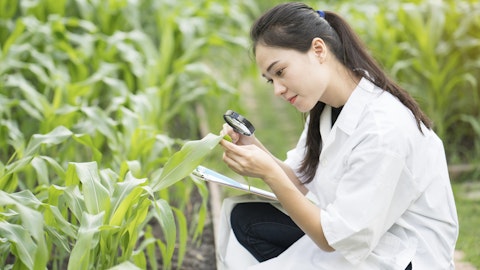Mark Wong: Yeah, I want to remind people on the call that there are long development times in Ag and it took us five years of investment to bring Double Team to the place where it is making significant contributions to our EBITDA. And those giant losses that we incurred now are getting smaller and smaller and we expect profitability here hopefully next year and cash sustainability also. And that’s obviously really important in this market where funding is difficult to raise. So, we’re trying to focus on the near term opportunities and what is going to really make us money and control our costs as we do that and control our inventory obsolescence and stuff like that. As you might imagine though we have a very strong position in Australia.
We’re probably in the top three seed companies in Australia. We actually have more Australian sales, if you count the sales to the Middle East, which we manage out of Australia than we have in the US. But our US margins with Double Team are a bit higher. So, we’re putting trial amounts of Double Team hybrids into the Australian market. We think that it’s going to take some work to make sure that they perform well in Australia. There’ll be some selection needed. So it’s not going to be as quickly as a new gene like during free that we’re introducing in the US where we understand the germplasm really well. We’re just going through that process in Australia. So the bad thing is it takes a little bit of time. The good thing is the markets, once they respect your trait you can look forward to a long, long harvest of the value.
Monsanto harvested their trade stacks for more than 20 years before the competitors had a stack to put into the market. So we think that the stack trade business is a real improvement over just a single gene trade like Double Team.
Gerry Sweeney: Got it. One last question and then I’ll jump back in line. Sure. We talked about licensing herbicide resistant Double Team. And like everything else in Ag, it’s a little bit of a process. I was curious if you could give us an update on if that’s still part of the strategy.
Mark Wong: Sure. Yeah. So it’s still definitely a strategy. It was the Monsanto strategy to both include the traits in your own bags of seed plus license the traits to your competitors, because the profit margins are so big on these traits that there’s enough margin to basically allow your competitors to make a profit and the farmer obviously to make money on the acres that he buys and still have margin left for the originator of the gene. Again, I’ll state it’s very, very unusual for a small company like S&W to originate genes. The fact that we have Double Team and then we have another gene coming in grain sorghum, and we’re looking at forward sorghums and a worldwide strategy, all of that is something that big companies do not small companies, but, we’ve been doing this a long time, the management staff at S&W and we’re comfortable with what you need to do technically to sort of get performance in the farmer’s field and that regulatory approval and then increase the amount of seed.
These are all things that give you protection against other people trying to come up with similar genes. And like I said, the industry is basically, this is such a difficult process that the industry basically licenses the genes from the gene leader rather than tries to develop their own. That’s been the model for the last 25 years, and we think that that’s going to continue. And we think that right now we’re in discussions with a couple of our competitors and hopefully in the next year or two, we’ll have some announcements there on people who believe that the Double Team is something that they should license and put in their own product lines.
Gerry Sweeney: Okay. Got it. I appreciate it. Thanks for the update.




